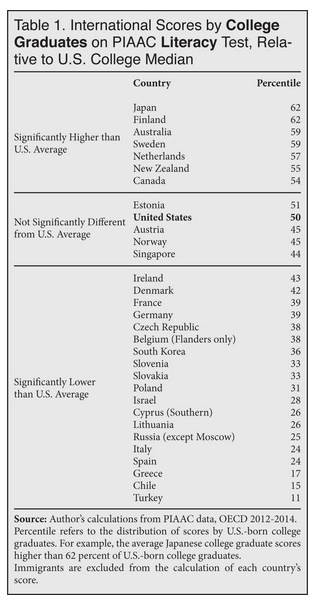The Skill Level of the Average College Graduate Varies Enormously Across Countries
Marguerite Telford, Center for Immigration Studies, April 22, 2019
A new Center for Immigration Studies analysis finds that higher levels of education among immigrants to the United States do not necessarily translate to higher levels of skill, as skill levels vary drastically by country of origin.
Jason Richwine, an independent policy analyst and author of the analysis, said, “When we look at test scores among college graduates, we see huge variations by country, with a lot of countries substantially underperforming the U.S. average. Given such disparate cross-country standards, educational credentials alone are probably not sufficient to determine which immigrants are ‘high-skill’.”
View the full analysis: https://cis.org/Richwine/Skill-Level-Average-College-Graduate-Varies-Enormously-Across-Countries
The test scores in the analysis come from the OECD’s Program for the International Assessment of Adult Competencies (PIAAC), and examine the literacy, numeracy, an computer operations skills of people who live in other countries, immigrants excluded.
On all three tests, enormous variations were found by country. For example, with regard to numeracy, Japanese college graduates score better than 70 percent of American college graduates, but Italian graduates score better than just 34 percent of American college graduates. Given the magnitude of differences on display among people with supposedly equal levels of education, policymakers ought to consider more than educational attainment when assessing an immigrant’s potential skill level.
Contact:
Marguerite Telford
Director of Communications, Center for Immigration Studies
(202) 466-8185
mrt@cis.org
 [Editor’s Note: The study is available here and includes five other charts similar to the one above.]
[Editor’s Note: The study is available here and includes five other charts similar to the one above.]















